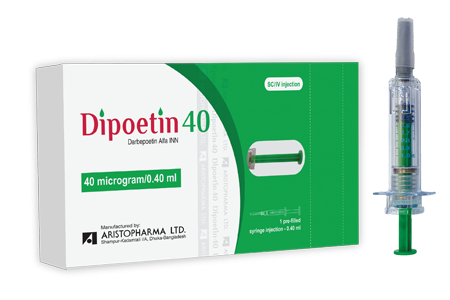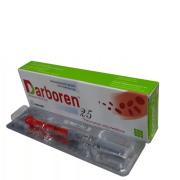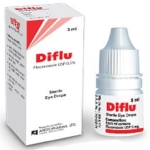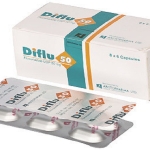Dipoetin (Darbepoetin Alfa)
Dipoetin (Darbepoetin Alfa) is an erythropoiesis-stimulating agent that is produced in Chinese Hamster Ovary (CHO) cells by recombinant DNA technology. Dipoetin (Darbepoetin Alfa) is a 165-amino acid protein containing 5 N-linked oligosaccharide chains, whereas recombinant human erythropoietin contains 3 chains. Erythropoietin is a glycoprotein that is the primary regulator of erythropoiesis through specific interaction with the erythropoietin receptor on the erythroid progenitor cells in the bone marrow.
Description
Dipoetin (Darbepoetin Alfa) is an erythropoiesis-stimulating agent that is produced in Chinese Hamster Ovary (CHO) cells by recombinant DNA technology. Dipoetin (Darbepoetin Alfa) is a 165-amino acid protein containing 5 N-linked oligosaccharide chains, whereas recombinant human erythropoietin contains 3 chains. Erythropoietin is a glycoprotein that is the primary regulator of erythropoiesis through specific interaction with the erythropoietin receptor on the erythroid progenitor cells in the bone marrow. The production of erythropoietin primarily occurs in and is regulated by the kidney in response to changes in tissue oxygenation. Hypoxia and anemia generally result in an increase in endogenous erythropoietin production, which in turn stimulates erythropoiesis. Dipoetin (Darbepoetin Alfa) stimulates erythropoiesis by the same mechanism as endogenous erythropoietin.
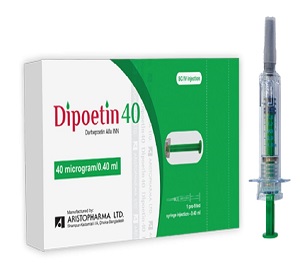
Presentation
Dipoetin 40 microgram solution for injection in pre-filled syringe: Each 0.40 ml pre-filled syringe contains recombinant Darbepoetin Alfa INN 40 microgram.
Dipoetin 60 microgram solution for injection in pre-filled syringe: Each 0.30 ml pre-filled syringe contains recombinant Darbepoetin Alfa INN 60 microgram.
Indications
Dipoetin is indicated for the treatment of anemia due to –
– Chronic Kidney Disease (CKD) in patients on dialysis and patients not on dialysis.
– The effects of concomitant myelosuppressive chemotherapy, and upon initiation, there is a minimum of two additional months of planned chemotherapy.
Dosage & Administration
For adult patients with CKD on dialysis:
– Initiate Dipoetin treatment when the hemoglobin level is less than 10 g/dL.
– Recommended starting dose is 0.45 mcg/kg intravenously or subcutaneously as a weekly injection or 0.75 mcg/kg once every 2 weeks as appropriate. The intravenous route is recommended for patients on hemodialysis.
– If the hemoglobin level approaches or exceeds 11 g/dL, reduce or interrupt the dose of Dipoetin.
For adult patients with CKD not on dialysis:
– Initiate Dipoetin treatment when the hemoglobin level is less than 10 g/dL
– The recommended starting dose is 0.45 mcg/kg intravenously or subcutaneously given once at four week intervals as appropriate.
– If the hemoglobin level exceeds 10 g/dL, reduce or interrupt the dose of Dipoetin & use the lowest dose of Dipoetin sufficient to reduce the need for RBC transfusions.
For pediatric patients with CKD:
– Initiate Dipoetin treatment when the hemoglobin level is less than 10 g/dL.
– The recommended starting dose for pediatric patients (less than 18 years) is 0.45 mcg/kg given as a single subcutaneous or intravenous injection once a week; patients not receiving dialysis may be initiated at 0.75 mcg/kg once every 2 weeks.
– If the hemoglobin level approaches or exceeds 12 g/dL, reduce or interrupt the dose of of Dipoetin.
Dose adjustment for CKD patients:
If a dose adjustment is required to maintain hemoglobin at the desired level, it’s advised that the dose is adjusted approximately by 25%. If the increase in hemoglobin is inadequate (less than 1 g/dL in four weeks), increase the dose by 25%. Dose increases must not be made more frequently than once every four weeks. Decreases in dose can occur more frequently. Avoid frequent dose adjustments. If the hemoglobin rises rapidly (more than 1 g/dL in any 2-week period), reduce the dose of Darbepoetin Alfa by 25% or more as needed to reduce rapid response. Conversion of Erythropoietin Alfa to Darbepoetin Alfa (Dipoetin) in patients with CKD on dialysis. Dipoetin is administered less frequently than Erythropoietin Alfa.
– Initiate Dipoetin once weekly in patients receiving Erythropoietin Alfa 2 to 3 times weekly.
– Initiate Dipoetin once every 2 weeks in patients who were receiving Erythropoietin Alfa once weekly.
Treatment of anemia in cancer patients on chemotherapy:
– Initiate Dipoetin treatment when the hemoglobin level is less than 10 g/dL, and if there is a minimum of two additional months of planned chemotherapy.
– The recommended starting dose & schedules are 2.25 mcg/kg every week subcutaneously until completion of a chemotherapy or 500 mcg every 3 weeks subcutaneously until completion of a chemotherapy course.
Preparation and Administration:
● Do not shake. Do not use Darbepoetin Alfa that has been shaken or frozen.
● Protect pre-filled syringe from light.
● Do not use any pre-filled syringes exhibiting particulate matter or discoloration.
● Discard unused portion of Darbepoetin Alfa.
● Do not dilute and do not administer in conjunction with others drug solutions.
Contrainidications
Darbepoetin Alfa is contraindicated in patients with uncontrolled hypertension, Pure Red Cell Aplasia (PRCA) that begins after treatment with Darbepoetin Alfa or other Erythropoietin protein drugs, serious allergic reactions to Darbepoetin Alfa.
Warning & Precautions
Using Darbepoetin Alfa & other ESA may increase the risk of mortality, myocardial infarction, stroke, thromboembolism, congestive heart failure, thrombosis of hemodialysis vascular access, and other thromboembolic events in higher target groups.
Side effects
Patients with CKD: Hypertension, dyspnea, peripheral edema, cough & procedural hypotension.
Patients with cancer receiving chemotherapy: Abdominal pain, edema, thrombovascular events.
Drug interaction
No drug interaction studies have been conducted with Darbepoetin Alfa.
Use in special groups
Pregnancy: There are no adequate well-controlled studies of Darbepoetin Alfa in pregnant women. Animal studies do not indicate direct harmful effects with respect to pregnancy. Caution should be exercised when prescribing Darbepoetin Alfa to pregnant women.
Nursing mothers: There is no information regarding the presence of Darbepoetin Alfa in human milk, the effects on the breastfed child or the effects on milk production. Caution should be exercised when Darbepoetin Alfa is administered to nursing mother.
Pediatric use: Pediatric patients with CKD: The safety and effectiveness of Darbepoetin Alfa with CKD receiving and not receiving dialysis have been established in the age groups 1 month to 16 years old. No data are available on pediatric patients less than 1-month-old. Pediatric patients with cancer: The safety and efficacy of Darbepoetin Alfa in pediatric patients with cancer have not been established.
Packing
Dipoetin 40 microgram solution for injection in pre-filled syringe: Each box contains 0.40 ml pre-filled syringe injection containing recombinant Darbepoetin Alfa INN 40 microgram.
Dipoetin 60 microgram solution for injection in pre-filled syringe: Each box contains 0.30 ml pre-filled syringe injection containing recombinant Darbepoetin Alfa INN 60 microgram.

